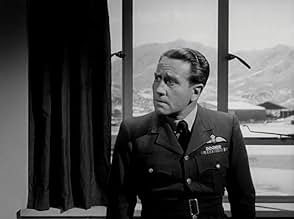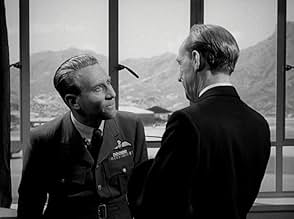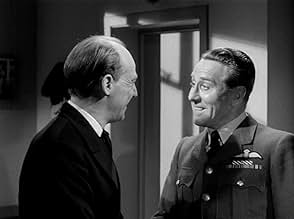IMDb-BEWERTUNG
7,0/10
1726
IHRE BEWERTUNG
Füge eine Handlung in deiner Sprache hinzuOn a routine flight from Hong Kong to Japan, a British military transport aircraft's fate may or may not depend on a prophetic nightmare.On a routine flight from Hong Kong to Japan, a British military transport aircraft's fate may or may not depend on a prophetic nightmare.On a routine flight from Hong Kong to Japan, a British military transport aircraft's fate may or may not depend on a prophetic nightmare.
- Nominiert für 4 BAFTA Awards
- 4 Nominierungen insgesamt
Empfohlene Bewertungen
A 1950's movie from the British studios. The basis of the plot is relatively simple, however, the outcome is never really obvious. It may not keep you on the edge of your seat biting your nails but it does keep you guessing till the end. A few lines at the very end by two of the lesser characters adds a finish not really seen till the advent of the "Twighlight Zone" TV series. Shakespeare used the use of dreams in many of his plays. This created his characters thoughts and actions. It seems that this method is used in this film for the same reason and pushes the movie along. The movie has a classic British cast such as Michael Redgrave and Denholm Elliott. Whilst the other actors names might not be easily recalled. They are readily identifiable and seen in numerous British movies of the 1940's and 50's. There is a small amount comic relief in the movie through the minor characters of two British soldiers. Australian viewers may even find hard to recognize one of them as being the local classic actor Bill Kerr. It is an old fashioned movie worthy of a watch.
This is a film which will stay with you for a long time. Its title sets the tone for what follows : a flight which, as it continues, looks more and more to be one that will end in disaster and thus, apparently, mean that a man's dream regarding it will come frighteningly true. The increasing sense of foreboding is alleviated at one time or another by a development that appears to be at odds with the dream, that is, until something else transpires which then sees the exact circumstances of the dream restored. It is a film which, not unnaturally, gives rise to tension-laden conversations about whether there is such a thing as fate, but that is not the main impact of this film, which is that one's attention is riveted from the opening scene to the final shocking end.
until
until
On display is one of the greatest scenarios ever presented in film - a flight over the Orient of which an anonymous British officer has had a dream premonition of disaster. What is so great about this idea and how it was executed here is that the dream itself is simply a catalyst for a psychological probing of the behavior of the passengers once they learn one-by-one about the particulars of the dream and how these particulars are playing out in their real flight. The theme then becomes the old-as-Shakespeare literary idea of fate vs. free will, but the strength of the filmmakers is that it is never resolved conclusively in the end. Even when the characters do hint at not letting a particular passenger on board the plane because this passenger has been prophesized to be an integral part of the disaster, they take no serious action to remove him, instinctively realizing that even that may not give them greater control over the situation.
The contrast of a modern technological artifice such as an aircraft with an archaic-style premonition is so brilliant because it portrays the ultimate paradox of human technological evolution: the farther human beings advance in their technological feats of control, paradoxically, the greater their lives are placed in the hands of the gods (fate) with all the many ways in which that technology can go tragically awry. For a simple idea, the filmmakers were obviously thinking, and they have added multiple layers to the story. "Night My Number Came Up" is a film I hope to see many times to pick up some themes I missed the first time. Like paintings, writing, and other forms of art, I believe that it is this characteristic which distinguishes great art from all the rest.
The contrast of a modern technological artifice such as an aircraft with an archaic-style premonition is so brilliant because it portrays the ultimate paradox of human technological evolution: the farther human beings advance in their technological feats of control, paradoxically, the greater their lives are placed in the hands of the gods (fate) with all the many ways in which that technology can go tragically awry. For a simple idea, the filmmakers were obviously thinking, and they have added multiple layers to the story. "Night My Number Came Up" is a film I hope to see many times to pick up some themes I missed the first time. Like paintings, writing, and other forms of art, I believe that it is this characteristic which distinguishes great art from all the rest.
From the title, I was expecting a gambling yarn along the lines of "The Man Who Broke The Bank At Monte Carlo", but instead I got a very British suspenser directed by the late, venerable British film critic Barry Norman's old dad Leslie. It's got a good cast too of top British talent, including Michael Redgrave, Sylvia Sim and a young Denholm Elliott and just-as-young Michael Hordern, who actually looks pretty much like his later, much older self.
The story has the hallmark of the much later Hollywood "Final Destination" series as Hordern's non-traveling R.A.F. commander reveals to Alexander Knox's ambitious Far Eastern diplomat a weird dream he had the night before of a particular group of people including Knox, on a particular flight flying into a terrible life-threatening storm over Japan. Knox has never flown and dreads the thought when he's corralled into the aerial mission but is comforted when the personnel details Hordern provided don't match up to the expected passengers, but that all changes when the ducks all line up in a row overnight as the aeroplane type and planned passenger list eerily changes to match the related dream.
That list, which prominently includes Redgrave's senior Air Marshall and his P.A. Elliott, a former pilot now reduced to ground duties after suffering a nervous breakdown from his war-time pilot duties, is expanded to include initially two late-returning soldiers, then a young woman, Sim, a lordly government V.I.P. Ralph Truman and to complete the fateful eight (passengers) a spivvy, gobby businessman and his elderly male secretary who, added to the crew of five, headed by pilot Nigel Stock, take the total personage on board to unlucky 13. As the story of the dream leaks out, mostly from the terrified Knox, the passengers start to fear the worst, especially when the plane flies off course and straight into an almighty storm...
I found the first hour of the movie rather slow-moving, with stereotypical character types demonstrating the familiar British traits of reserve and stiff-upper-lip. The little model plane used for the exterior shots is hardly convincing either as it takes a supposed battering and just how or why Hordern dreams his dream is left unexplained. I also kept expecting some sort of emotional outburst from Elliott's obviously damaged character while Sim's character and that of the two working-class squaddies seem just like so much padding.
However, the tension ratchets up nicely as the film hurtles towards its destiny, there's a pretty effective crash scene and a neat pay-off joke as Hordern's character reveals the outcome of his latest sleep to his next acquaintance on the ground.
Overall, this was a good under-the-radar movie to get on board and if not an absolute high-flier, certainly made for an interesting and entertaining journey.
The story has the hallmark of the much later Hollywood "Final Destination" series as Hordern's non-traveling R.A.F. commander reveals to Alexander Knox's ambitious Far Eastern diplomat a weird dream he had the night before of a particular group of people including Knox, on a particular flight flying into a terrible life-threatening storm over Japan. Knox has never flown and dreads the thought when he's corralled into the aerial mission but is comforted when the personnel details Hordern provided don't match up to the expected passengers, but that all changes when the ducks all line up in a row overnight as the aeroplane type and planned passenger list eerily changes to match the related dream.
That list, which prominently includes Redgrave's senior Air Marshall and his P.A. Elliott, a former pilot now reduced to ground duties after suffering a nervous breakdown from his war-time pilot duties, is expanded to include initially two late-returning soldiers, then a young woman, Sim, a lordly government V.I.P. Ralph Truman and to complete the fateful eight (passengers) a spivvy, gobby businessman and his elderly male secretary who, added to the crew of five, headed by pilot Nigel Stock, take the total personage on board to unlucky 13. As the story of the dream leaks out, mostly from the terrified Knox, the passengers start to fear the worst, especially when the plane flies off course and straight into an almighty storm...
I found the first hour of the movie rather slow-moving, with stereotypical character types demonstrating the familiar British traits of reserve and stiff-upper-lip. The little model plane used for the exterior shots is hardly convincing either as it takes a supposed battering and just how or why Hordern dreams his dream is left unexplained. I also kept expecting some sort of emotional outburst from Elliott's obviously damaged character while Sim's character and that of the two working-class squaddies seem just like so much padding.
However, the tension ratchets up nicely as the film hurtles towards its destiny, there's a pretty effective crash scene and a neat pay-off joke as Hordern's character reveals the outcome of his latest sleep to his next acquaintance on the ground.
Overall, this was a good under-the-radar movie to get on board and if not an absolute high-flier, certainly made for an interesting and entertaining journey.
The seediness of the post-war colonial Far East and that rather morbid fascination with death and fate that pervades the consciousness of people who have been through a world-shattering conflict flavours this film. A great script (by RC Sherriff of 'Journeys End' fame) and a great cast - headed by that master of actorly understatement, Micheal Redgrave - slowly build the story, bit by bit. The exotic setting, where strange things could happen. The drab ordinariness of military outposts - which hightens the surreality of the events. A sense of a military and aristocratic world giving way with poor grace to the brash 'modern' future - epitomised by the crass Brummagem scrap dealer (accompanied by his effete elderly public-school personal assistant). The sense of dread is created by the pure spoken word and performance - of a good tale well-told. MR James in the age of Dakotas.
Wusstest du schon
- WissenswertesThe script is based on a personal account by Sir Victor Goddard.
- PatzerClearly, different cockpits were used in different shots. The altimeter keeps switching back and forth between two quite different designs and layouts.
- Zitate
Mary Campbell: Anyone with sense has doubts.
- Crazy CreditsOpening credits, prior to film title: There were 8 passengers 5 crew
Top-Auswahl
Melde dich zum Bewerten an und greife auf die Watchlist für personalisierte Empfehlungen zu.
- How long is The Night My Number Came Up?Powered by Alexa
Details
- Erscheinungsdatum
- Herkunftsland
- Sprache
- Auch bekannt als
- The Night My Number Came Up
- Drehorte
- Ealing Studios, Ealing, London, England, Vereinigtes Königreich(studio: made at)
- Produktionsfirmen
- Weitere beteiligte Unternehmen bei IMDbPro anzeigen
- Laufzeit1 Stunde 34 Minuten
- Farbe
- Seitenverhältnis
- 1.33 : 1
- 1.85 : 1(originally intended theatrical ratio)
Zu dieser Seite beitragen
Bearbeitung vorschlagen oder fehlenden Inhalt hinzufügen



































